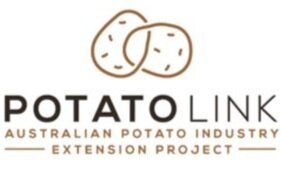PotatoLink demonstration: Using biologicals in a commercial farm setting
A recent PotatoLink demonstration trial at Springbank, Vic, investigated the impact of farm practices on the effectiveness of biologicals, including the application of fungicides, the influence of soil nutrient availability, and fertiliser applications. In Issue 10 of PotatoLink magazine you will find all the details of the trial as well as the results.
PotatoLink Podcast Episode 3: Magnesium demonstration at the Canowindra NSW
Stephanie Tabone (PotatoLink and AHR) talks to NSW's regional representative Marc Hingerager about his 2022 magnesium demonstration trial in Canowindra NSW. They discuss the trial, the results and why magnesium is important.
PotatoLink Podcast Episode 1: Potassium demonstration at Canowindra, NSW
Stephanie Tabone (PotatoLink and AHR) talks to NSW's regional representative Marc Hingerager about his 2022 Potassium demonstration trial in Canowindra NSW. They discuss the trial, the results and why potassium is important.
Interpreting soil test reports
The correct interpretation of the report, is vital to ensure fertiliser applications are adequate to supply crop requirements. This factsheet covers important considerations while soil sampling and testing, the common parameters tested and which nutrients can be reported.
The changing nutrition needs of a growing crop
Knowing what your plants need and when is crucial to getting the most out of your crop. This factsheet covers the importance of soil tests, in-season tissue testing, how nutrients interact with each other and fertiliser application methods.
Matching irrigation to crop growth
Ensuring plants get the right amount of water when they need it is essential to produce a great crop. In this factsheet, Dr Jenny Ekman covers water stress, waterlogging and how to make sure your potatoes are getting the right amount of water.
Petiole testing for nutrient analysis
Petiole sampling and analysis is an effective and simple way to determine the nutrient status of a crop, including diagnosing any deficiencies or toxicities in potato plants. Like any analyses, getting the sampling right is the first step. In this PotatoLink magazine article, learn when to sample, how to sample and how to handle samples.
Pathogens - it’s all in their DNA
Developed by SARDI (South Australian Research and Development Institute), PREDICTA Pt is a commercial DNA testing service that can identify which pathogens are in the soil or skin of seed tubers.
In Issue 05 of PotatoLink magazine, Ryan Hall and Jenny Ekman from the PotatoLink team report on PREDICTA Pt including a 5-year case study describing its use in monitoring powdery scab and rhizoctonia on a commercial farm.
Cover crops for fresh market and processing potatoes in Australia
Potato grower, Darren Long and Dr Kelvin Montagu talk all things cover crops and discuss how they can assist with building up soil health – including practical tips & tricks!
Precision agriculture for the potato industry - Imagery is more than just pretty pictures
PotatoLink team member Frank Mulcahy discusses historical mapping and crop conformance, redictive crop modelling, pioneering Variable Rate Irrigation (VRI) on farm and results from finished 2 year project on spatial variability in potato crops.
The role of biologics in soil health & enhancing crop productivity in potatoes
Albert Schirring covers the role of biologicals in soil health and the opportunities in enhancing crop productivity in potatoes.
Growing right SA – Serious about seed, how to get a better crop stand
Dom Cavallaro (Stoller), Ian Simpson (Mitolo), Nigel Crump (AuSPICA) and Peter Philp (PotatoLink) discuss seed management, quality and timing of supply and how quality seed is the foundation of profitable potato production.
Potassium: A vital macronutrient in potato production — A review
With information from 48 peer-reviewed studies this review provides the most up to date understanding of potassium nutrition for potatoes.
Plant analysis for vegetable crops - A practical guide to sampling, analysis and interpretation
Plant analysis is used as a tool to fine tune the nutrition of crops. The nutrient status of plants or parts of plants can be determined directly via laboratory analysis or estimated via in-field testing, while the overall health and nutrient status of a crop can be assessed via non-destructive sensing technologies.













